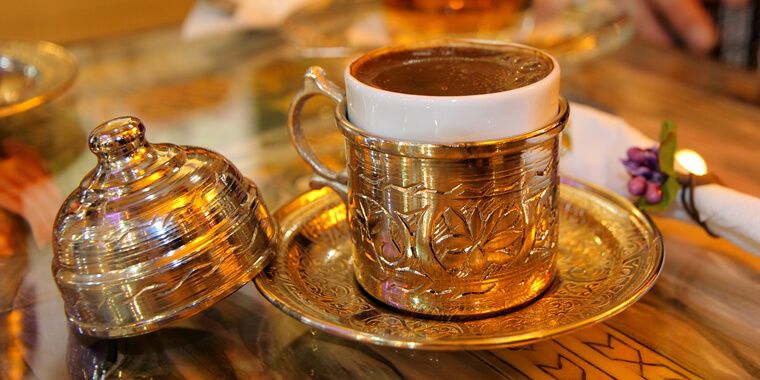Brings esteem for Forty years – Dates back 1300 years
The origin of the coffee tree is Africa (Ethiopia to be exact), far away from the shores of Turkey. Nor is Turkey a coffee producer. But the Turkish have a very special place in the history of coffee. Turkish coffee is the only type served with its grounds and is the most suitable for fortune telling.
The proverb “a cup of coffee brings esteem for forty years” sufficiently explains its fame in Turkey. The Turks took it as a measure of esteem, offered it to their guests, drank a cup of it after every meal and tried to read the future from the signs in the cup.
Coffee trees like warm weather very much. Very, very much! According to hearsay, it was discovered by a shepherd in the Kaffa region of Ethiopia in the 8th century. For many centuries it was confined within the boundaries of Ethiopia and was used for very different methods than those of today. Locals crushed the coffee beans into flour to make bread with it, boiled its fruits and used the pot water as medicine. Around the 10th century, coffee went to the Arabian Peninsula and it started to be boiled and drunk in a way similar to today, i.e. scorching, grinding and boiling.
Some sources say that the date of arrival of coffee in Istanbul is the 1500’s. However, many other sources go back farther. Furthermore, they also give an address in Istanbul. Kiva Inn, which was established in 1471 in Tahtakale, is said to be the first known café in the world. Sources which indicate the era of Yavuz Sultan Selim and the year 1517 for the arrival of coffee also tell about the same address despite the date difference; they tell that Kiva Inn in Tahtakale had introduced Yemen coffee to residents of Istanbul. Whatever the date was, it is clear that coffee was a center of taste among Ottomans in a very short time and it was even held in high honor in the palace.
Even though Courts of Shariah Law in Mecca declared coffee “nonkosher”, it was announced “religiously permissible” by the Ottomans in 1524. This interest grew stronger during the era of Suleiman the Magnificent, even a rank in the palace called “head coffee maker” was created. The head coffee maker used to be selected from among “very reliable” names as he would take on such a task. For this reason, he used to be respected very much and even promoted to higher ranks later on.
The Ottomans are also known as the “first coffee importers” in the world. Coffee’s journey to Europe was also via Istanbul as Venetian merchants carried the taste they became familiar with in gradually increasing coffeehouses to Venice. Then coffee went further into Europe as of the 1600’s. It was first sold by lemonade sellers in the streets. Afterwards, just as it had been in Istanbul, coffeehouses were opened. Entering into the Europe continent from Venice, the coffee carried on its journey to more significant stops. According to the records, it reached Paris exactly in 1643 and London in 1651.
Even though it was born in Ethiopia and developed in the Arabian Peninsula, it is very natural that coffee is mentioned together with the name “Turk” as it spread in Europe and from there in the world from Istanbul. Also the oldest coffee brand in the world belongs hereabouts. That brand is Kurukahveci Mehmet Efendi, which has a 150-year-old story. During the 1800’s coffee was being sold as raw beans, scorched in houses and ground in coffee hand mills. A very young entrepreneur, Mehmet Effendi, who was educated in Süleymaniye Madrasah, took a historical step in 1871. He started selling “ready coffee” in a shop he took over from his father. His fame spread through Istanbul instantly just like the smell of freshly ground coffee.
Although it varies in taste and appearance, counterparts of the word ‘coffee’ in almost all languages are very close to each other. It is named as ‘coffee’ in English, ‘Kaffee’ in German, ‘café’ in French, ‘caffe’ in Italian; Dutch call it ‘koffie’, Hungarians call it ‘kàvè’, Romanians call it ‘kava’, Russians call it ‘kophe’, Chinese call it ‘kafei’, and Japanese call it ‘kohi’. Armenians, on the other hand, fall very far away from the word coffee with a name like, ‘soorj’.

